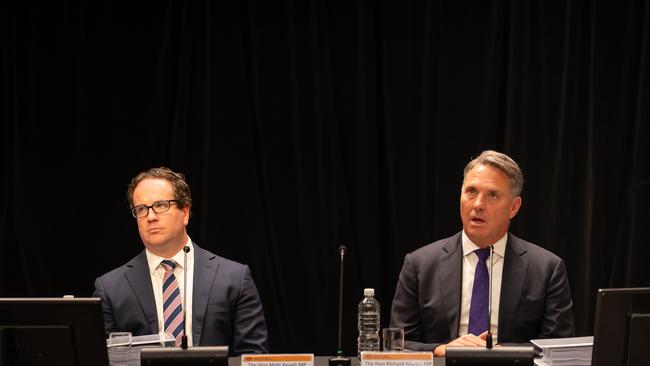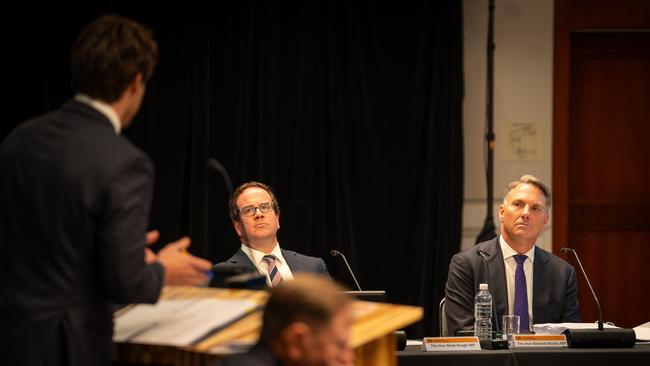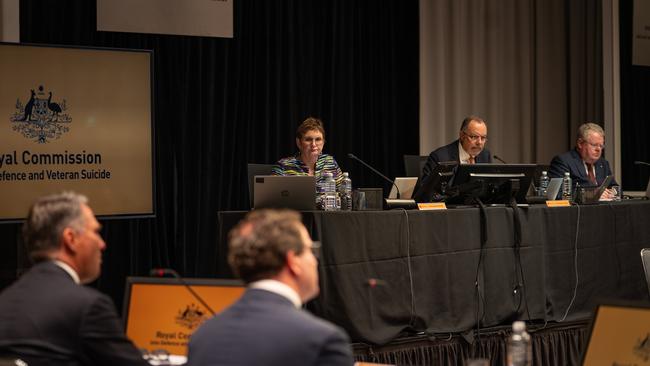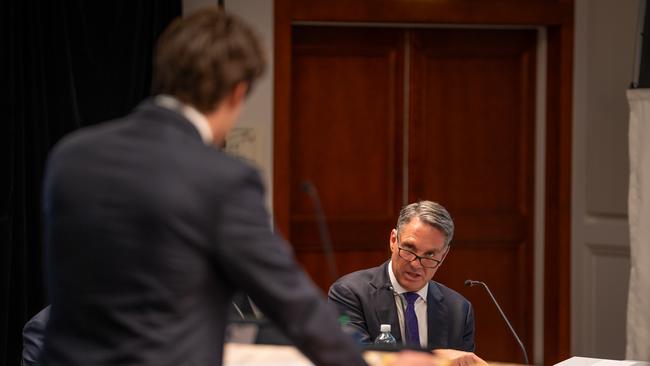‘History will judge’: Labor defends defence suicide call at Royal Commission
Defence Minister Richard Marles says ‘history would judge’ whether Labor had been right not to extend an inquiry into defence suicides, saying the government genuinely wanted to make real change.
Breaking News
Don't miss out on the headlines from Breaking News. Followed categories will be added to My News.
Richard Marles has defended the government’s decision not to give commissioners probing defence and veterans suicides an additional 12 months, saying the call had come from a genuine desire to “get moving on this”.
The Defence Minister said history would ultimately be the judge on whether the government had made the right choice, as he maintained Labor had a desire to stamp out suicide in the defence community as best it could.
Mr Marles, alongside Defence Personnel and Veterans’ Affairs Minister Matt Keogh, appeared at the Royal Commission into Defence and Veterans Suicides on Thursday, where they asked families impacted by the issue not to judge them by their testimony, rather by the action they take at the end of the process.
After more than 1600 veterans took their lives between 1997 and 2020, the then-Coalition government set up the inquiry in 2021 to examine systemic and institutional factors impacting suicide in the defence and veterans communities.
The Royal Commission handed the new Labor government an interim report containing 13 recommendations in August 2022, and is now in its last block of hearings, ahead of an expected final report in September.

In 2022, the Royal Commission had its reporting period extended from June 2023 to June 2024.
Last year it requested a further one year extension, which the Albanese government refust, but later granted the commissioners a further three months till September to hand down its findings
Mr Marles said history would judge whether or not the government had made the right call, but it had come from a place of genuinely wanting to effect “meaningful change in the context of a very large organisation”.
“On the one hand, I understand there were more important stories to be told and heard. But on the other, we need to see change happening now,” he said.
“We need to get moving on this, that’s how we feel as a government.
“We wanted your recommendations this year, so we could get cracking on this now.”
Mr Marles said the government was willing and waiting to look at any and all recommendations of commissioners Peggy Brown, James Douglas and Nick Kaldas, including on resourcing.

The royal commission has heard from families of veterans who took their own lives and how the systems had let them down.
On Wednesday, the commission heard how a former Navy clearance diver was left “broken’ after receiving a report from the military about the details of his brother’s suicide – which he picked up from the post office – ten years after the death.
“I’d loyally served my nation, I’d recruited for my nation, and this is how they were giving me the report into my little brother’s death,” he said.
Under questioning from commissioner Brown on Thursday, Mr Keogh was asked what words he had to offer the families of veterans who’d taken their lives.
“I’m very conscious that my words will never make up for the loss they feel and will continue to feel, and will never leave them,” Mr Keogh said.
“I think any family that experiences suicide is left with a huge hole, and asking many questions about what could have been done differently and what other support might have been provided.
“And certainly that issue, and what are things that could be done better differently and put in place that would mean we have less suicide, and hopefully no suicide, from serving members and our veteran community?
“We want to do that.”
Mr Marles said he wanted the families to “hear our acknowledgment of their pain”.
“But I actually don’t want families to judge us on what we say right now. Judge us on what happens at the end of the day. What is actually going to matter is what you recommend and what we ultimately implement,” he said.
“History will be the judge. And I want the families to know that we are deeply mindful that in all that we do, we will not be able to escape the judgment of history.”

Mr Marles and Mr Keogh said the government was taking the issue seriously and were eager to see what recommendations the Royal Commission put to the government.
“I think one of the key takeaways (from this inquiry), and we saw this before we came into government, is that the rate of suicide across particularly the veteran community is a national tragedy,” Mr Keogh said.
“That’s why we supported the calls for the establishment of this Royal Commission.
“There’s some particular trends in cohorts within the veteran community where we see particular prevalence of suicide, which are very concerning, but also useful to understand because it helps ultimately focus the attention of this Royal Commission and its recommendations, and the work that government will need to pursue in terms of improving support.”
Data shows that men under 30 who were medically discharged from defence are a cohort with a particularly prevalent rate of suicide.
“That’s clearly an area where we need to, as a government, provide greater focus and attention, and we’re trying to do that,” Mr Keogh said.

Earlier, the former commander of Australia’s special forces told the Royal Commission he had made mistakes as a leader, and that the issue was as “diverse and complex” as people.
Retired major general Jeff Sengelman said the Royal Commission was built on a foundation of “sadness, sad stories and terrible things”.
“I’ve got some inside of me,” he said.
He conceded there were lessons learnt that “perhaps shouldn’t have been learned”.
“Did I make mistakes as a leader, and in hindsight, do I regret them?” he asked.
“Yes, yes.”
Originally published as ‘History will judge’: Labor defends defence suicide call at Royal Commission




